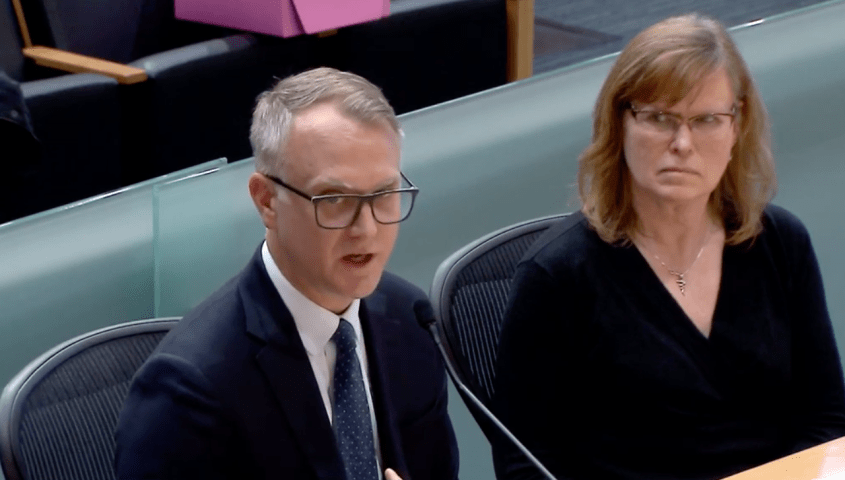
1. City council member Lisa Herbold struggled Wednesday to get Human Services Department Director Jason Johnson to answer her question about future layoffs from HSD’s Homeless Strategy and Investment (HSI) division, which is merging with King County’s homelessness division as part of the creation of a new regional homelessness authority. At a meeting of the council’s special committee on homelessness, Herbold asked Johnson repeatedly how many HSI employees would be moving to new offices in the county-owned Yesler Building as part of a temporary “co-location” of city and county staff, and how many are expected to have jobs with the new authority. “I’m hearing a lot of speculation about which positions are going to be eliminated,” Herbold said. “Given that the entire HSI division is being relocated [in March and we aren’t making final decisions about who will stay at the regional authority until much later, is there something happening that we should be aware of?”
Johnson responded first by describing the history that led to the current organizational structure of HSI, then talked at length about the successive organizational structures that will be put in place over the next year. “What is going to occur is colocation in March 2020, then after the hiring of the CEO, we will begin what is termed a loan period where day to day decisions are made by the CEO, but there will also be existing lines of authority back to the city and the county…”
“I’m frustrated that Interim Director Johnson seemed to filibuster in a way that made it very difficult for me to ask my specific question and he definitely didn’t answer it.”—Council member Lisa Herbold
His explanation—which did not include an answer to Herbold’s question about layoffs—went on for so long that council member Kshama Sawant jumped in to say that she hoped the council could wrap up talking about the regional authority quickly so that the committee could move on to “the most substantive issue” on the agenda, her proposal to vastly expand tiny house villages in the city, since she had somewhere else to be. (Council member Debora Juarez said that while she appreciated Sawant’s desire to move on to her own item, “I want to point out that we spent 90 minutes on a resolution that we didn’t even pass”—Sawant’s resolution condemning India’s National Register of Citizens and Citizenship Amendment Act—and “I, for one, want to hear how this is going to get implemented.”)
After the meeting, Herbold told me that she never did get answer to her question: “If the entirety of HSI staff are colocating and layoff decisions aren’t being made final until either a 2020 supplemental or 2021 proposed budget, when exactly between those two points in time will HSI staff learn their jobs are proposed to be eliminated?” Herbold says she was “frustrated that Interim Director Johnson seemed to filibuster in a way that made it very difficult for me to ask my specific question and he definitely didn’t answer it.”
2. Juarez was hardly the only council member casting shade on Sawant’s nonbinding resolution on India, which—along with a resolution opposing war in Iran—took up most of the council’s two-hour-plus regular meeting on Monday. Freshman council member Alex Pedersen said he would propose a resolution condemning all forms of oppression everywhere, just to cover all possible bases. “There’s many disturbing issues going on today for which we do not have resolutions, and my resolution is broad enough to capture instances of oppression that we might be missing,” Pedersen said. “Allow me to ask that we try to not craft a city council council resolution for every horrible thing that our president or any world leader does.”
Pedersen’s resolution, if it ever does see the light of day, is unlikely to find traction among his colleagues, who seemed to consider it a stunt designed to embarrass Sawant. Sawant, for her part, immediately used the proposal as an opportunity to drag her colleagues for lacking the “moral and political courage” to address housing and homelessness. “Passing resolutions is not the barrier. The barrier is lack of courage,” she said.
3. Tomorrow afternoon, Beyonce St. James—the formerly homeless drag artist who spoke and performed at All Home King County’s annual conference last year—will appear in court to seek an injunction against the release of public records that include her legal name and other identifying information. I received a notice of the hearing because I requested St. James’ invoice for the event, for which she charged $500. (Attendees reported that they were told St. James was volunteering her time and performing for tips; video of the event shows attendees tossing and handing her cash.) St. James (not her legal name) is asking that all her personal information be kept private because she has already been threatened and harassed over her performance and fears further harassment if her address and other details are made public.





